RELG 402 - World's Living Religions
Chinese Traditional Religion
Chinese Festivals
Click on the Thumbnails to see larger pictures
Hover the mouse over a Thumbnail to see the caption
The Chinese calendar is a complex system with cycles of sixty years, twelve years (the Chinese Zodiac), and one year. The Chinese year combines both lunar and solar calendars - the main points of the year are marked by the solstices and equinoxes which determine the beginning of seasons and which are regulated by the Yin-Yang variations.
 Chinese New Year or Spring Festival occurs somewhere between January 21 and February 19, on the first day of the first lunar month of the year. It lasts for 14 days, and is followed immediately by the Lantern Festival on the 15th day of the first month.
Chinese New Year or Spring Festival occurs somewhere between January 21 and February 19, on the first day of the first lunar month of the year. It lasts for 14 days, and is followed immediately by the Lantern Festival on the 15th day of the first month.
Preparation for Chinese New Year starts the day before, when the family cleans the house out thoroughly to sweep out ill fortune and make the place ready to receive good luck. This is also the time that Zao Jun, the Kitchen God, is "sent" to Heaven to report on the family - He is sent by burning the paper picture of him which had been above the stove during the past year.
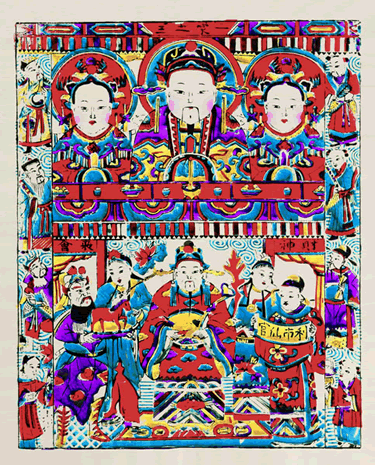 The family may also have an annual reunion dinner at this time. Windows and doors are decorated with the lucky color red, money in red envelopes is given to people, and firecrackers are set off to scare away evil spirits.
The family may also have an annual reunion dinner at this time. Windows and doors are decorated with the lucky color red, money in red envelopes is given to people, and firecrackers are set off to scare away evil spirits.
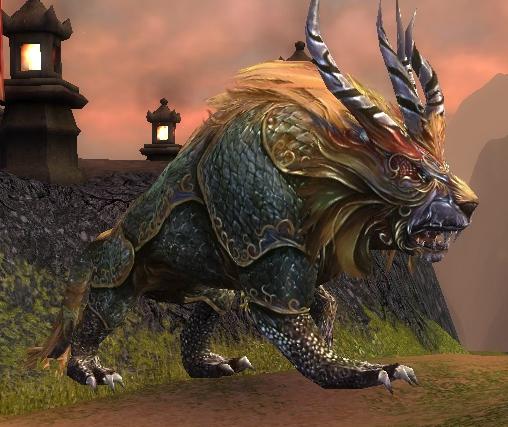 According to some of the legends, a mythical beast called the Nian would invade villages on the first day of the year to eat livestock, crops, and even children. So the villagers set out food for the beast in the hope that it would eat that instead. One day one of the gods told a villager that the beast was afraid of the color red, so everyone decorated their houses with red paper, hung red lanterns, and used firecrackers to scare the beast away. The Nian never came back to that village, but was eventually caught and tamed by a Taoist monk. That is why people use red decorations, light firecrackers, and offer food to the gods at Chinese New Year.
According to some of the legends, a mythical beast called the Nian would invade villages on the first day of the year to eat livestock, crops, and even children. So the villagers set out food for the beast in the hope that it would eat that instead. One day one of the gods told a villager that the beast was afraid of the color red, so everyone decorated their houses with red paper, hung red lanterns, and used firecrackers to scare the beast away. The Nian never came back to that village, but was eventually caught and tamed by a Taoist monk. That is why people use red decorations, light firecrackers, and offer food to the gods at Chinese New Year.
On the first day of the New Year the gods are welcomed with fireworks, and as much noise as possible is made to drive off evil spirits. This is a time to honor one's elders, and families visit the most senior members of their family.
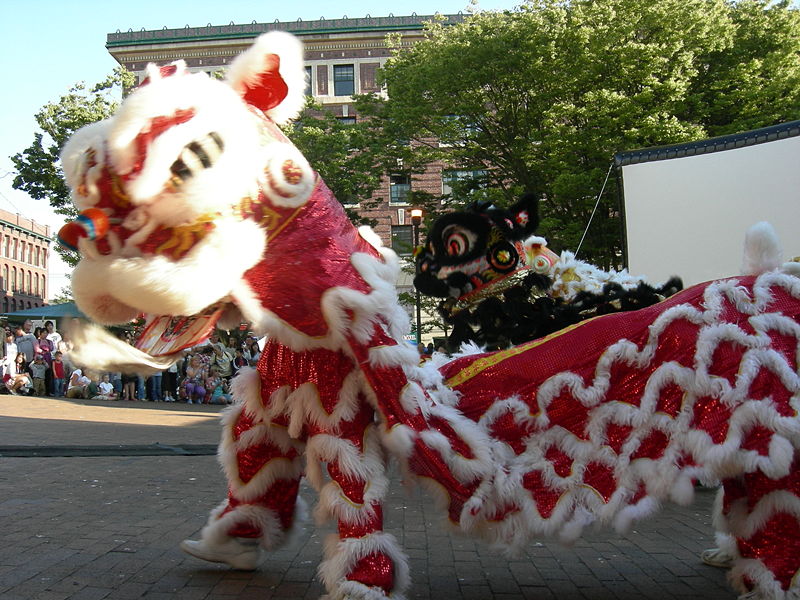 Lion Dances may be held during Chinese New Year - one or two people are costumed as a very ornate lion which dances through the streets and may visit homes. The head of the Lion used to be carved of wood, but is now usually papier-mâché on a bamboo frame. The eyes and mouth are moveable, and often also the tongue and ears. The body is covered with fur, and the tail may have bells on it. The Lion dances to the sound of a drum and cymbals, and its movements are related to the martial arts such as Kung Fu. As part of the dance someone offers it lettuce or green vegetables to eat, though the reason for this is lost in antiquity. Lions did not occur naturally in China, so the Chinese Lion is mythological rather than natural.
Lion Dances may be held during Chinese New Year - one or two people are costumed as a very ornate lion which dances through the streets and may visit homes. The head of the Lion used to be carved of wood, but is now usually papier-mâché on a bamboo frame. The eyes and mouth are moveable, and often also the tongue and ears. The body is covered with fur, and the tail may have bells on it. The Lion dances to the sound of a drum and cymbals, and its movements are related to the martial arts such as Kung Fu. As part of the dance someone offers it lettuce or green vegetables to eat, though the reason for this is lost in antiquity. Lions did not occur naturally in China, so the Chinese Lion is mythological rather than natural.
Some Lion Dances have five lions of different colors.
Lion dances may also be held at other festivals of the year, and at funerals, weddings or other special events.
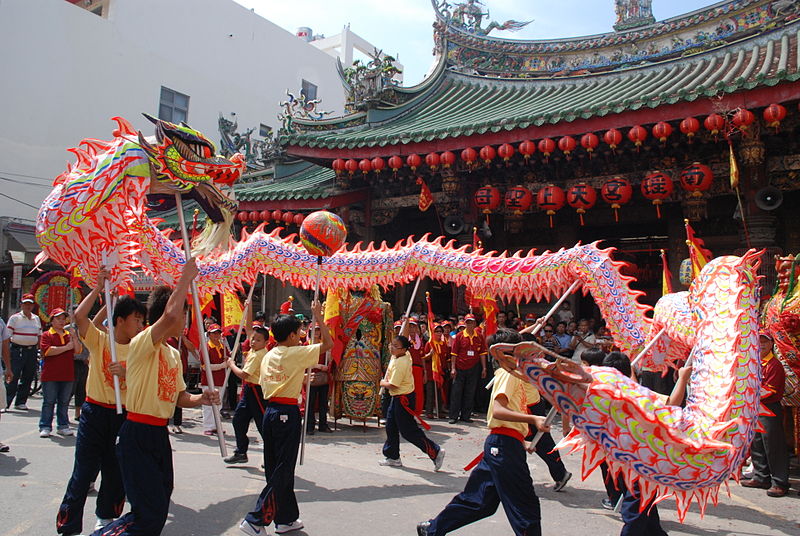
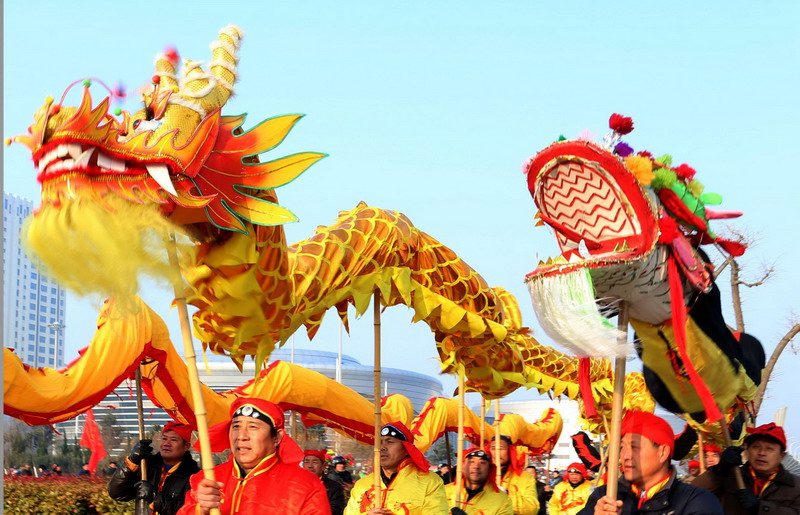 The Dragon Dance may also be performed during the New Year celebrations, and at other times of the year. A team of many people holding the dragon's body on poles above themselves performs a running dance in which the dragon winds through the streets, rising and dipping and twining under itself. The dragon is accompanied by someone holding a sphere on a pole in front of it - this represents a pearl of wisdom, which the Dragon wants. Chinese dragons are thought of as being friendly and helpful, rather than ferocious like European dragons.
The Dragon Dance may also be performed during the New Year celebrations, and at other times of the year. A team of many people holding the dragon's body on poles above themselves performs a running dance in which the dragon winds through the streets, rising and dipping and twining under itself. The dragon is accompanied by someone holding a sphere on a pole in front of it - this represents a pearl of wisdom, which the Dragon wants. Chinese dragons are thought of as being friendly and helpful, rather than ferocious like European dragons.
The celebrations on succeeding days vary according to the region and traditions, and most have traditional foods which are eaten on particular days. The birthday of the Jade Emperor is celebrated with a party on the 9th or 10th day of the New Year.
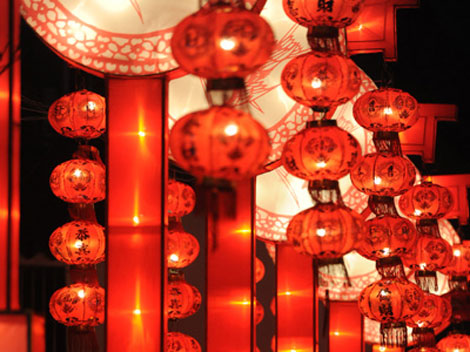 The 15th day of the first month marks the end of the New Year celebration with the Lantern Festival, when people carry lantern through the streets at night and put lighted candles outside their houses to guide the spirits home. They also decorate the doors of their houses with red. It occurs at the time of the first full moon of the Chinese year, usually in February or March. People gather for family reunions and eat glutinous rice balls filled with bean paste.
The 15th day of the first month marks the end of the New Year celebration with the Lantern Festival, when people carry lantern through the streets at night and put lighted candles outside their houses to guide the spirits home. They also decorate the doors of their houses with red. It occurs at the time of the first full moon of the Chinese year, usually in February or March. People gather for family reunions and eat glutinous rice balls filled with bean paste.
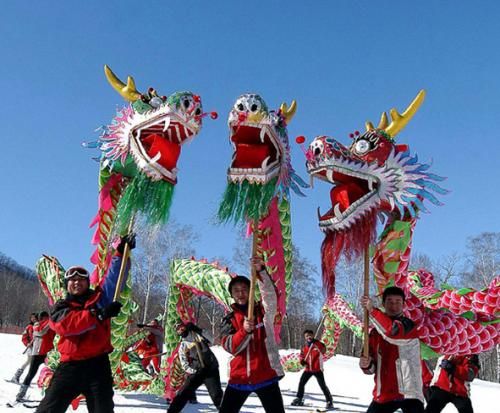 On the 2nd day of the 2nd month the Blue Dragon Festival, "Dragon Raising its Head", Zhonge Festival takes place. The dragon is believed to be the king of all the creatures, and to be in charge of bringing the rains, so villagers pray for rain as the growing season begins. People eat Chinese pancakes and noodles, visit the temple of the local Tudi Gong, and a temple fair is held.
On the 2nd day of the 2nd month the Blue Dragon Festival, "Dragon Raising its Head", Zhonge Festival takes place. The dragon is believed to be the king of all the creatures, and to be in charge of bringing the rains, so villagers pray for rain as the growing season begins. People eat Chinese pancakes and noodles, visit the temple of the local Tudi Gong, and a temple fair is held.
On the 3rd day of the 3rd month the Shangsi Festival or Double Third Festival is held. Traditionally, people went for an outing and a picnic, and picked orchids.
Tomb Sweeping Day or the Qingming Festival takes place 15 days after the Spring equinox (usually around April 5). Families visit and clean the gravesites of their ancestors, make offerings of food, tea, paper money, and have a day's outing and maybe fly kites. This was the time when Spring ploughing started in the farming communities.
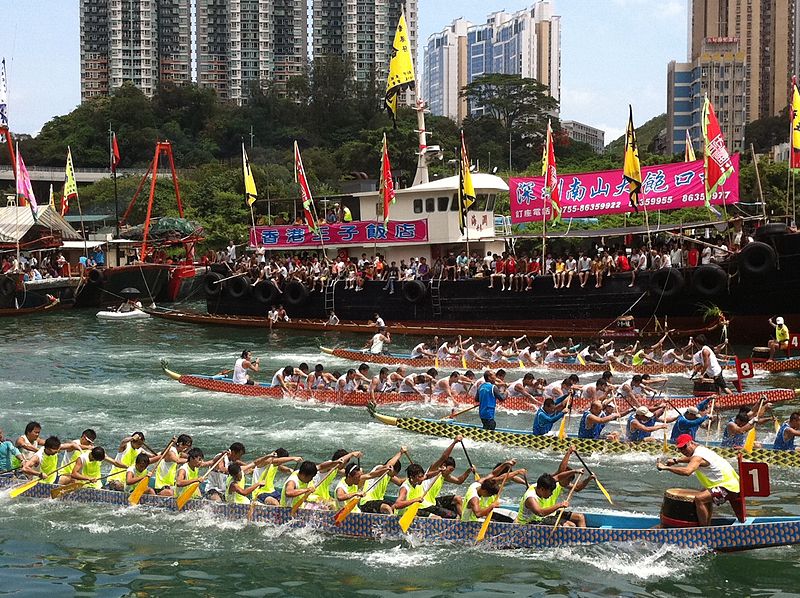 On the 5th day of the 5th month the Dragon Boat Festival, Duanwu Festival or Double Fifth Festival is celebrated with Dragon Boat races and special foods such as sticky rice treats and wine. This festival takes place around the time of the Summer solstice, when Yang energy is at its peak. The Chinese dragon, and the sun, represent the male energy of Yang.
On the 5th day of the 5th month the Dragon Boat Festival, Duanwu Festival or Double Fifth Festival is celebrated with Dragon Boat races and special foods such as sticky rice treats and wine. This festival takes place around the time of the Summer solstice, when Yang energy is at its peak. The Chinese dragon, and the sun, represent the male energy of Yang.
Several versions are given of the origin of the festival. In one, the poet Qu Yan (ca. 340-278 BC) committed suicide by throwing himself into the Miluo River. Local people raced out in their boats to save him, but were unsuccessful. Then they threw balls of sticky rice into the river so that the fish would eat the rice instead of Qu Yuan's body.
Another version is that the festival commemorates the death of Wu Zixu, who was a loyal advisor to his king, but who was forced to commit suicide by the king (in 484 BC), and then his body was thrown into the river on the 5th day of the 5th month.
Yet another tradition holds that the festival commemorates the death of the young girl Cao E in 143 AD. Her father fell into the Shun River, and Cao E searched in the river for three days. After five days both Cao E and her father were found dead by drowning. The river was renamed Cao'e and a temple was built in her honor.
On the 7th day of the 7th month the Qixi Festival is held. It is based on a story about two young lovers, the cowherd and the weaver girl. Some traditions describe the Weaver girl as the daughter of the Jade Emperor, others describe her as the daughter of the Moon goddess. The young lovers were separated, but for one day in the year a flock of magpies formed a bridge so that they could cross to meet one another. They eventually became two stars in the sky, separated by the Milky Way. This is a festival particularly for young girls and women to display their housekeeping skills and go to the temples to pray for a good husband.
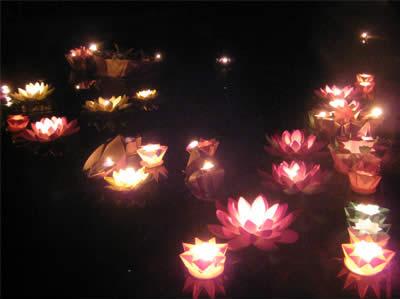
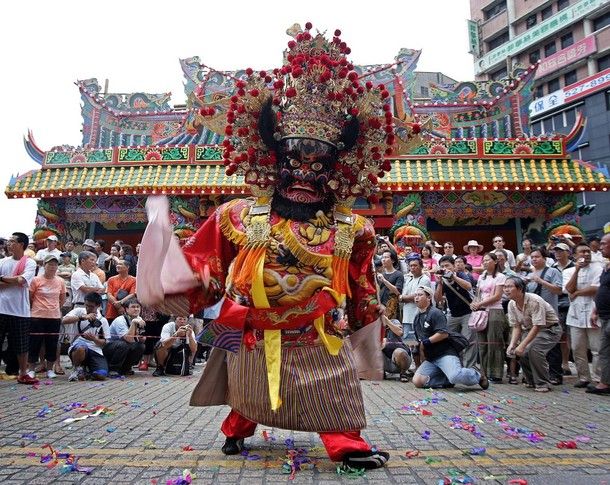 On the 15th day of the 7th month the Hungry Ghost Festival is celebrated. It is believed that the spirits of deceased ancestors come out of their graves and visit the living. Families make offerings and burn incense to their ancestors, vacant seats for each of the ancestors are provided at the family banquet. At the Chinese opera and at other shows the seats in the first row are left vacant so that the ghosts can sit there. Paper boats and lanterns are floated on water to guide the spirits home.
On the 15th day of the 7th month the Hungry Ghost Festival is celebrated. It is believed that the spirits of deceased ancestors come out of their graves and visit the living. Families make offerings and burn incense to their ancestors, vacant seats for each of the ancestors are provided at the family banquet. At the Chinese opera and at other shows the seats in the first row are left vacant so that the ghosts can sit there. Paper boats and lanterns are floated on water to guide the spirits home.
People observe many taboos during the Ghost month - Don't go walking at night, Don't swim (the ghosts of drowned people will get you), Don't get married. Don't start a new business. If you find money in the street, do not pick it up. Don't wear red (it attracts ghosts). Don't sing or whistle (it will bring the ghosts) Keep away from walls (ghosts stick close to walls).
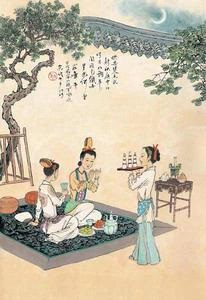
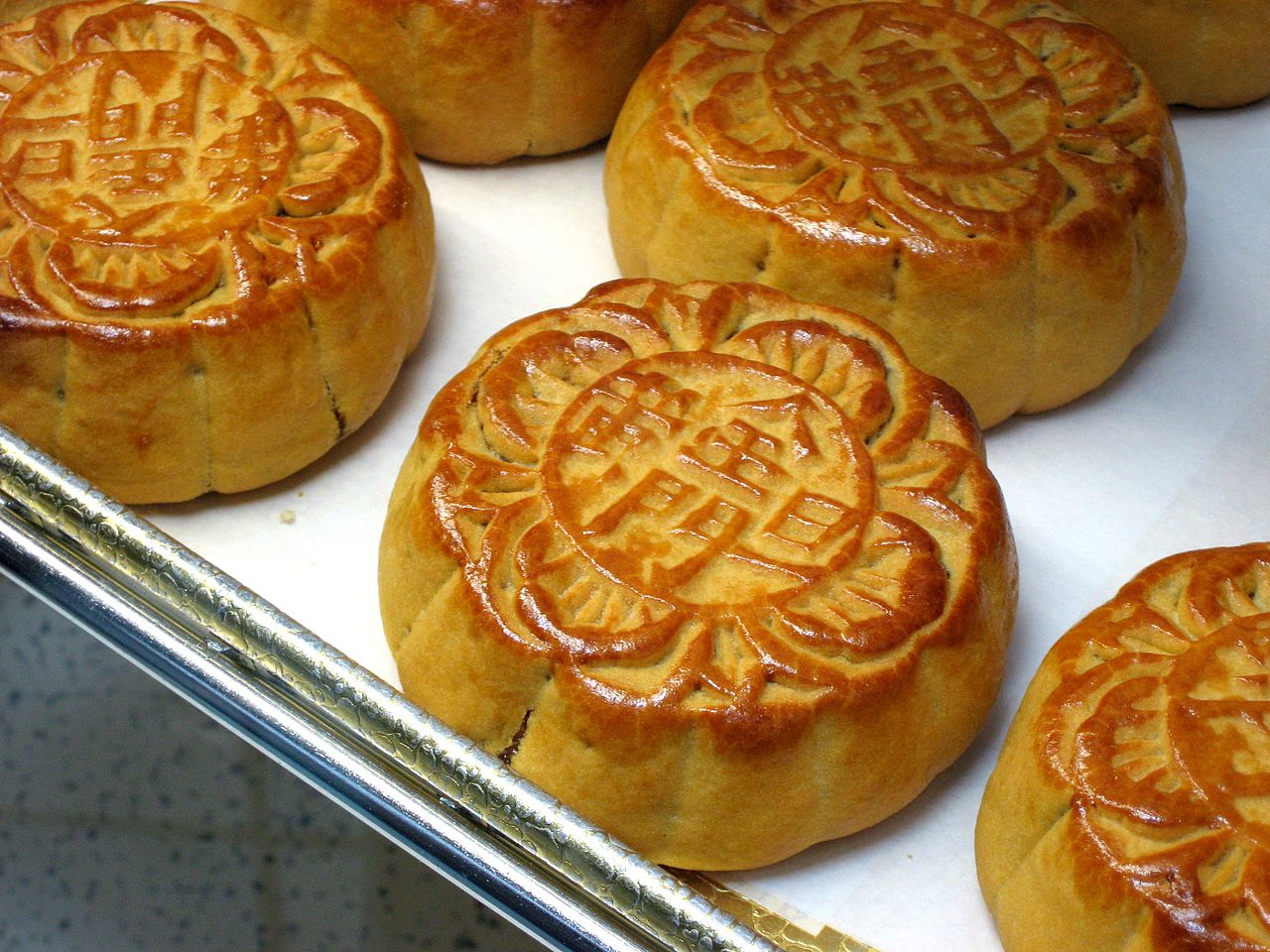 On the 15th day of the 8th month the Mid-Autumn Festival or Moon Festival is celebrated. It is basically a harvest festival, but there is also an element of moon worship when the Moon goddess is venerated. People sit outdoors, eat mooncakes (pastries with a sweet paste filling), and watch the autumn full moon while drinking tea. There may be parades with brightly lit lanterns. Some regions also celebrate with dragon dances or lion dances. In the year 2015 it occurs on September 27; in 2016 it will occur on September 15.
On the 15th day of the 8th month the Mid-Autumn Festival or Moon Festival is celebrated. It is basically a harvest festival, but there is also an element of moon worship when the Moon goddess is venerated. People sit outdoors, eat mooncakes (pastries with a sweet paste filling), and watch the autumn full moon while drinking tea. There may be parades with brightly lit lanterns. Some regions also celebrate with dragon dances or lion dances. In the year 2015 it occurs on September 27; in 2016 it will occur on September 15.
On the 9th day of the 9th month the Double Ninth Festival, Chongyang Festival is celebrated. This festival dates back at least 2,000 years.
The number nine has a high degree of Yang and is regarded as dangerous, so the Double Nine is a time of potential danger. People drink chrysanthemum wine (thought to be cleansing) or Chrysanthemum tea and wear protective herbs. It is also a time when families visit the graves of their ancestors to burn incense to them, go hiking (one of the traditional stories involves villagers hiding on a hill while one brave man went to defeat a monster), eat rice cakes, recite poems about chrysanthemums, and view exhibits of chrysanthemums.
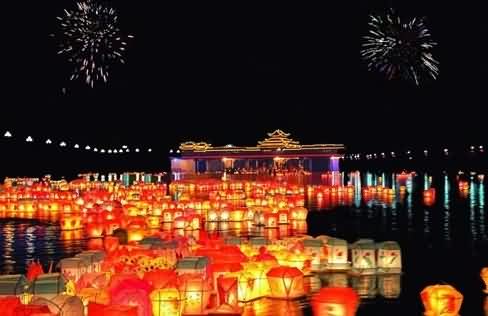 On the 15th day of the 10th month the Water Lantern Festival or Spirit Festival is celebrated.
On the 15th day of the 10th month the Water Lantern Festival or Spirit Festival is celebrated.
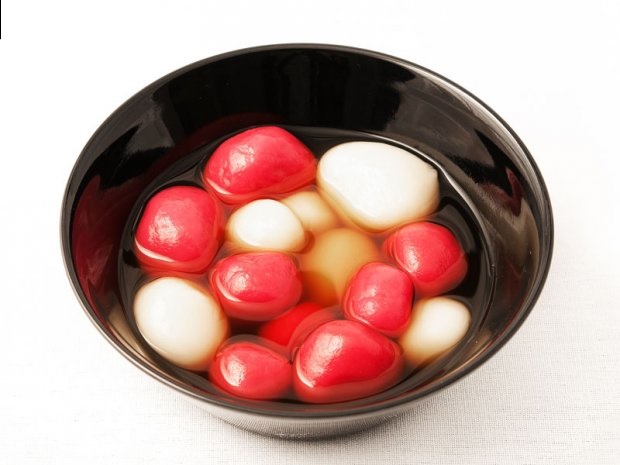 On the Winter Solstice (December 21st or 22nd) Yin is at a maximum, and the Dongzhi Festival is celebrated. Families gather together to make and eat balls of glutinous rice. The balls may be plain, or may have fillings, and they are cooked in a savory broth and eaten with the broth. The balls represent the reunion of the family. Some traditions require families to gather at an ancestral temple for worship, followed by a large meal.
On the Winter Solstice (December 21st or 22nd) Yin is at a maximum, and the Dongzhi Festival is celebrated. Families gather together to make and eat balls of glutinous rice. The balls may be plain, or may have fillings, and they are cooked in a savory broth and eaten with the broth. The balls represent the reunion of the family. Some traditions require families to gather at an ancestral temple for worship, followed by a large meal.
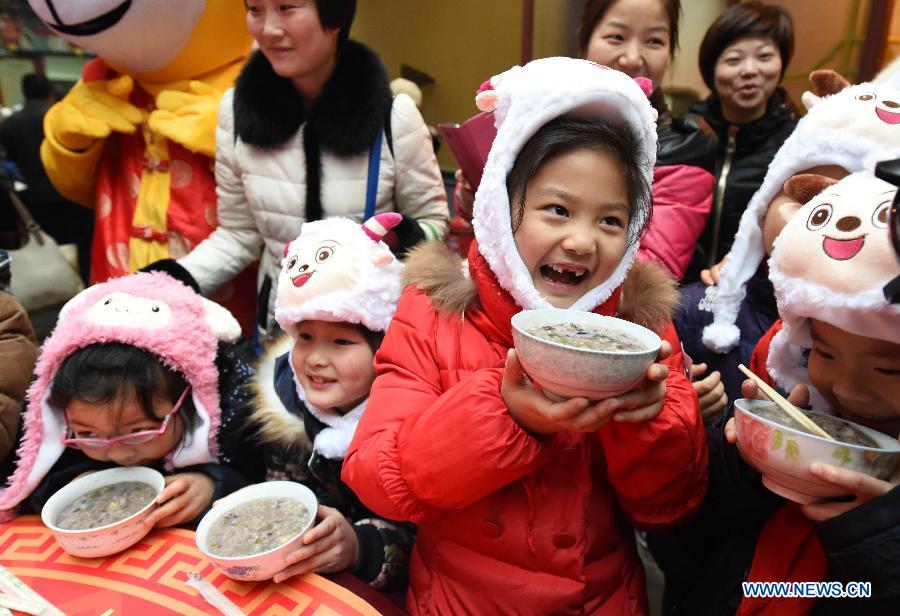 On the 8th day of the 12th month the Laba Festival is celebrated - this originated as a harvest festival, but when Buddhism reached China the festival was enhanced with ceremonies to commemorate the day on which the Buddha attained enlightenment. Special foods are eaten. Often the Buddhist temples will serve free Laba porridge to all comers.
On the 8th day of the 12th month the Laba Festival is celebrated - this originated as a harvest festival, but when Buddhism reached China the festival was enhanced with ceremonies to commemorate the day on which the Buddha attained enlightenment. Special foods are eaten. Often the Buddhist temples will serve free Laba porridge to all comers.
Copyright © 1999 Shirley J. Rollinson, all Rights Reserved